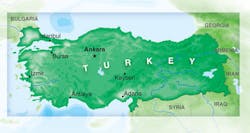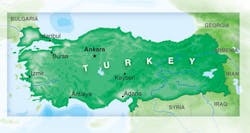The industrial laser market in Turkey
Laser exports and government support continue to grow
Koray Eken
A diversified economy, proximity to Europe, the Middle East, and Central Asia, integration with foreign markets, the external anchor of EU accession, solid economic management, and structural reform are the drivers of Turkey's long-term prospects. Since the crisis of 2001, the country has had one of the most successful growth performances in the world with economic expansion for 27 consecutive quarters between 2002 and 2008 due to increases in productivity, becoming the 17th largest economy in the world.
The machinery industry, crucial to the industrialization of all countries, has been the driving force behind Turkey's industrialization process, with rapid growth based on high value-added products and contributions to other sectors. As a result of this, the machinery industry has been more successful than other branches of the manufacturing industry, and the number of exports has constantly been above the average of the exports for Turkish industries overall. In terms of the value of the machinery produced, Turkey ranks sixth in Europe.
The machinery industry in Turkey has been growing at a rate of nearly 20% per year since 1990. Machinery production started to take up an increasing portion of the country's exports and, in 2011, exceeded $11.5 billion (8.57%) of total exports ($134.9 billion), which was an increase of 22.8% over the year before.
For the country's 100th anniversary in 2023, the machinery industry was given the ambitious export target to reach US$100 billion of exports with a share of 2.3% of the global market. The Turkish machinery industry was projected to have a compound annual growth rate (CAGR) of 17.8% by 2023, when the sector's share of Turkey's exports was expected to be no less than 18%.
SMEs
The growth of the Turkish machinery sector is backed by highly competitive and adaptable small and medium-sized businesses (SMEs), which form the bulk of industrial production. Turkish SMEs offer a young, dynamic, and well-trained labor force combined with a professional workplace attitude. In order to meet the financial needs of SMEs, there are some incentives granted, including exemption from customs duties, VAT exemption for imported and domestically purchased machinery and equipment, credit allocation from the budget, and credit guarantee support. Similarly, The Small and Medium Sized Industry Development Organization (KOSGEB) makes significant contributions to strengthening SMEs by various support instruments in financing, R&D, common facilities, market research, investment sites, marketing, exports, and training. In 2011, KOSGEB spent $208.3 million on this support.
As a result of the increase in the share of machinery sectors in total industrial exports containing high technologies, R&D expenditures have recently begun to rise. In 2010, R&D expenditures totaled $6.5 billion, which constituted 0.84% of GDP. In order to increase and encourage R&D activities, government institutions provide many incentives for R&D.
Industrial Laser Solutions has been tracking the significance of the Western Asian region, and specifically Turkey, as an increasingly important laser market. As an example, IPG Photonics has opened a new office in Istanbul, Turkey, to provide local support and service for the company's fiber lasers in Turkey and nearby countries. This demonstrates IPG's commitment to the region, which will enable the company to provide prompt and direct technical support to the numerous laser cutting OEMs in Turkey that use their high performance fiber lasers.
History of laser processing in Turkey
The history of laser processing in Turkey began with cutting applications in the 1990s, when imported cutting machines, specifically products from European machine manufacturers, were installed in automotive and defense industry companies. Today, lasers for cutting are still prevalent. Until 2010, CO2 lasers dominated as kilowatt-level tools for 2D cutting of both thin and thick metals. Then, fiber lasers came on strongly.
Trumpf and Rofin-Sinar are leading suppliers for CO2 lasers, while IPG dominates for fiber lasers, especially for marking and kilowatt lasers. Other large suppliers such as SPI Lasers and Rofin-Sinar also offer fiber laser products.
There are many companies that integrate laser systems by using the above subsystems. Some of them also export the products that they integrate to the US, India, Germany, Russia, and Brazil. Durmazlar (Bursa, Turkey – http//tr.durmazlar.com.tr), Ermaksan (Bursa – www.ermaksan.com.tr), Nukon (Bursa – www.nukon.com.tr), Servenom (Kayseri – www.servonom.com.tr), Coskunöz (Bursa – www.coskunoz.com.tr), and Ajan (Izmir – www.ajamcnc.com) have the major share of Turkish laser revenues, with Durmazlar being the largest laser cutting machine integrator in Turkey. Durmazlar, beginning with CO2 laser cutting machines, has produced kilowatt fiber laser cutting machines for the last several years. This company now produces more than 40 cutting machines a month, 10 of which are now kilowatt fiber laser units. Today 50,000 Durma machines contribute efficiency to different industries worldwide.
Ermaksan is another leading machinery company, producing more than 3000 machines annually, mostly integrated with CO2 lasers. They now offer kilowatt fiber laser machines as well.
Nukon implemented fiber lasers and exported the first of the four machines produced. The company will make a €3 million investment to reduce the present production process from 60 days to 15 days.
Servenom was founded in 2007 and started its production life with CNC laser cutting and marking and CNC plasma metal processing machine production. It is aiming to be one of the preferred brands of the world in its sector. With its €200 million turnover, Coskunöz started activities parallel to the Turkish manufacturing industry in 1950 and is now one of the leading industrial groups. Ajan was founded in 1973, and in the last few years has been focusing on sheet metal cutting and forming.
In 2005, Turkey's laser exports totaled $480,000 (23 lasers), while laser imports were $45.2 million (740 lasers). These rates gradually increased each year except in 2009, when the effects of the global economic recession hit, and the import rates declined to $46.9 million from $81.6 million in 2008. The rates recovered nearly all their losses by the end of 2010.
Nevertheless, the export rates were not affected by the recession, increasing from $7.6 million to $17.7 million that year. In 2011, the total number of Turkey's laser exports was about $27.8 million (126 lasers). When compared with export numbers, laser imports were higher with a total of $104.3 million (1,630 lasers). However, it is believed that import and export numbers are higher with lasers that import or export as a part of systems with different, even sometimes wrong, HS Codes (an international standard coding of trade products).
Important industries
Turkey has taken significant steps in the defense industry during the last 20 years. Being a foreign-dependent country in the past, today Turkey develops and produces its indigenous products through national opportunities. In the strategic plan for 2012–2016, presented by the Under-secretariat for Defense Industries, the aim is to reach $US2 billion for defense exports. Thus, there is a strong demand for defense companies to involve laser technology in development and production.
According to the Turkish Industrial Strategy Report covering the period between 2011 and 2014, the overall strategic aim of the country was determined as "increasing the competitiveness and efficiency of Turkish industry and expediting the transformation to an industry structure which has more share in world exports, where mainly high-tech products, with high added value, are produced, which has qualified labor and which at the same time is sensitive to the environment and the society." In order to achieve this aim, "increasing the weight of mid- and high-tech sectors in production and exports" is one of the basic strategic objectives that have been delineated. Energy, food, automotive, information, and communication technologies, "laser and optical systems," and machinery production technologies are defined as the primary areas that will be focused on this objective.
The Supreme Council for Science and Technology (SCST) is the highest ranking Science-Technology-Innovation (STI) policy-making body chaired by the Prime Minister, who has the decision-making power for national STI policy. At the 23rd Meeting of the SCST in 2011, it was emphasized that high-value-added sectors that improve economic welfare, provide technology improvement and increase competitiveness, with continuing R&D, have to be considered important sectors that increase competitiveness and provide sustainable development of Turkey. The optical sector is viewed as one of these powerful sectors.
Although the situation in the laser industry has improved quickly through interest in fiber lasers for the cutting sector and defense industry, Turkey had no laser production, importing all laser modules from abroad. Even without the data for the defense industry, the import of lasers was about $100 million. Thus, optic and laser technology was announced as a strategic technological area that will be supported by the government. For example, with government support, FiberLAST (Ankara - www.fiberlast.com.tr) was founded in 2007 as the first industrial company involved in R&D activity in the fiber laser area. The company designs, develops, and manufactures fiber lasers in Turkey (see sidebar "Turkey fiber laser pioneer").
As can be seen by this report, Turkey has become a vibrant market for industrial laser systems, and the country has also developed an expanding base of system suppliers that is making headway into many international markets. An incipient domestic laser activity has begun, which will start to supply the needs of system integrators. ✺
Turkey fiber laser pioneer
FiberLAST (Ankara), was the first industrial company involved in fiber laser R&D activity in Turkey. It was founded in 2007 to design, develop, and manufacture fiber lasers in Turkey. Supported by a group of university-based collaborators, FiberLAST's R&D team has developed its own proprietary fiber lasers. The company develops and produces fiber lasers with the collaboration of Bilkent University and Middle East Technical University (METU). While the main focus is on industrial systems, the company may also develop fiber laser systems for special customer needs and academic and scientific applications. FiberLAST has attracted considerable government R&D funding to date, having signed research contracts with KOSGEB (a government organization for supporting small and medium size entrepreneurs) and TUBITAK (The Scientific and Technological Research Council of Turkey). FiberLAST has the ability to follow academic improvements and apply them to its products and to develop proprietary and innovative products worldwide. With these approaches. its developed fiber laser technology is already in the market for marking applications.
Koray Eken([email protected]), CEO at FiberLAST, compiled this view of Turkey's industrial laser market for ILS.
More Industrial Laser Solutions Current Issue Articles
More Industrial Laser Solutions Archives Issue Articles

